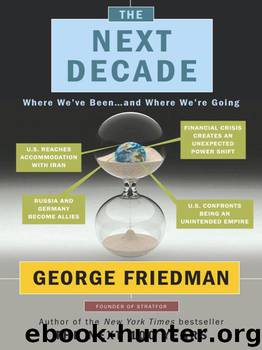George Friedman by The Next Decade: Where We've Been --;Where We're Going

Author:The Next Decade: Where We've Been --;Where We're Going
Language: eng
Format: mobi
Tags: Forecasting, International Relations, Political Freedom & Security, Intelligence, History & Theory, 21st Century, General, Intelligence & Espionage, World Politics, World Politics - 21st Century - Forecasting, Political Science, Future Studies, Social Science
ISBN: 9780385532945
Publisher: Random House Digital, Inc.
Published: 2011-01-25T06:00:00+00:00
CHAPTER 8
THE RETURN OF RUSSIA
The collapse of the Soviet Union appeared to signal Russia’s demise as an international player, but news of that death was premature. A nation so large, so filled with resources, and so strategically located doesn’t simply dissolve into the air. In the 1990s, the USSR’s fall nonetheless shattered the vast empire assembled by the czars and held together by the Communists, leaving Moscow in control of a fraction of what it held in 1989. Muscovy alone (and Siberia), the region that had been the kernel of the empire, remained in Russian hands. As long as that core remained, however, the game wasn’t over. The Russian Federation, sorely weakened, still survived, and it will play an increasingly significant role in the next decade.
While Russia suffered breakaway regions and an economy in shambles, the United States emerged as the sole remaining global power, able to dominate the planet in a casual, almost indolent fashion. But the Soviet collapse gave the United States only a limited time frame in which to drive a stake into the heart of its old rival, ensuring that it stayed down. The United States could have applied stress to the Russian system by supporting secessionist movements or by increasing economic pressure. Such moves might very well have caused the entire Russian Federation to crumble, enabling its former junior partners to absorb what was left and form a new balance of power in Eurasia.
At the time, however, the effort did not seem worth the risk, mostly because Russia appeared unlikely to emerge from its chaos for generations. Destroying what was left of Russian power did not even appear to be necessary, because the United States could create the regional balance of power it wanted simply by expanding NATO and the alliance system eastward.
But the United States was also deeply concerned about the future of the Soviet nuclear arsenal, which was even more massive than the American one. Further chaos in the region would have made the weapons vulnerable to terrorists and black marketers, among other risks. The United States wanted nuclear weapons within the former Soviet Union to be under the control of one state that could be watched and shaped, and that state was Russia, not Ukraine or Belarus or all the rest. Thus while the Russian nuclear arsenal had not preserved the Soviet Union, it did save the Russian Federation—at least from U.S. intervention.
During the 1990s the non-Russian members of the former Soviet Union, countries such as Kazakhstan and Ukraine, were desperate to be organized. By rapidly and aggressively integrating them into NATO, the United States could have increased the strength and cohesiveness of these encircling nations to bottle up Russia and the former Soviet republics as well, and Russia would have been helpless to stop the process.
Yet while the United States had plans to do exactly this, it did not move quickly enough. Only eastern Europe and the Baltic states were absorbed into NATO, a significant strategic shift that becomes more significant
Download
This site does not store any files on its server. We only index and link to content provided by other sites. Please contact the content providers to delete copyright contents if any and email us, we'll remove relevant links or contents immediately.
| Elections & Political Process | Ideologies & Doctrines |
| International & World Politics | Political Science |
| Public Affairs & Policy | Specific Topics |
| United States |
The Secret History by Donna Tartt(18564)
The Social Justice Warrior Handbook by Lisa De Pasquale(12039)
Thirteen Reasons Why by Jay Asher(8652)
This Is How You Lose Her by Junot Diaz(6623)
Weapons of Math Destruction by Cathy O'Neil(6004)
Zero to One by Peter Thiel(5588)
Beartown by Fredrik Backman(5488)
The Myth of the Strong Leader by Archie Brown(5333)
The Fire Next Time by James Baldwin(5144)
How Democracies Die by Steven Levitsky & Daniel Ziblatt(5048)
Promise Me, Dad by Joe Biden(5006)
Stone's Rules by Roger Stone(4959)
100 Deadly Skills by Clint Emerson(4767)
A Higher Loyalty: Truth, Lies, and Leadership by James Comey(4722)
Rise and Kill First by Ronen Bergman(4619)
Secrecy World by Jake Bernstein(4537)
The David Icke Guide to the Global Conspiracy (and how to end it) by David Icke(4503)
The Farm by Tom Rob Smith(4382)
The Doomsday Machine by Daniel Ellsberg(4335)
